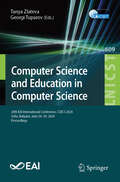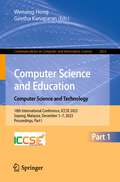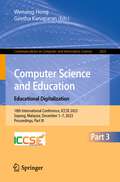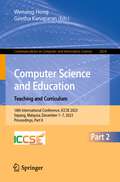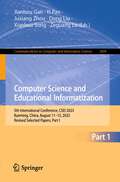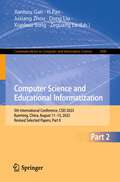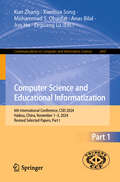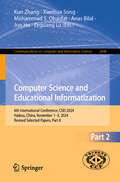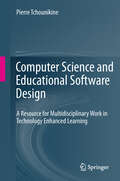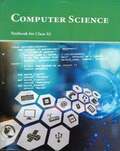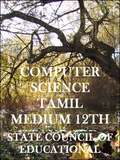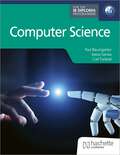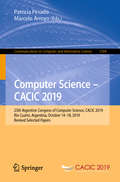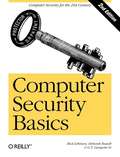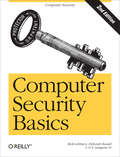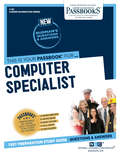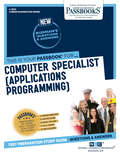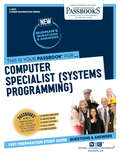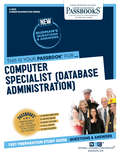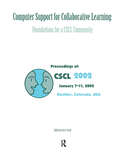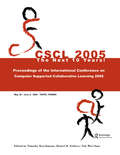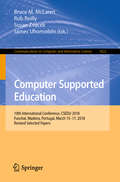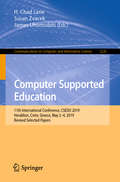- Table View
- List View
Computer Science and Education in Computer Science: 20th EAI International Conference, CSECS 2024, Sofia, Bulgaria, June 28–30, 2024, Proceedings (Lecture Notes of the Institute for Computer Sciences, Social Informatics and Telecommunications Engineering #609)
by Tanya Zlateva Georgi TuparovThis book constitutes the refereed post-conference proceedings of the 20th International Conference on Computer Science and Education in Computer Science, CSECS 2024, held in Sofia, Bulgaria, during June 28–30, 2024. The 19 full papers and 4 short papers were carefully reviewed and selected from 49 submissions.The papers cover the following topics: Computer Science Implementations; Computational Math; Computing Technologies; Implementations in Medicine; Engineering Implementations; Education in Computer Science.
Computer Science and Education. Computer Science and Technology: 18th International Conference, ICCSE 2023, Sepang, Malaysia, December 1–7, 2023, Proceedings, Part I (Communications in Computer and Information Science #2023)
by Wenxing Hong Geetha KanaparanThis three-volume set constitues selected papers presented at the 18th International Conference on Computer Science and Education, ICCSE 2023, held in Sepang, Malaysia, in December 2023. The 106 full papers and 36 short papers presented were thoroughly reviewed and selected from the 305 submissions. They focus on a wide range of computer science topics, especially AI, data science, and engineering, and technology-based education, by addressing frontier technical and business issues essential to the applications of data science in both higher education and advancing e-Society.
Computer Science and Education. Educational Digitalization: 18th International Conference, ICCSE 2023, Sepang, Malaysia, December 1–7, 2023, Proceedings, Part III (Communications in Computer and Information Science #2025)
by Wenxing Hong Geetha KanaparanThis three-volume set constitues selected papers presented at the 18th International Conference on Computer Science and Education, ICCSE 2023, held in Sepang, Malaysia, in December 2023. The 106 full papers and 36 short papers presented were thoroughly reviewed and selected from the 305 submissions. They focus on a wide range of computer science topics, especially AI, data science, and engineering, and technology-based education, by addressing frontier technical and business issues essential to the applications of data science in both higher education and advancing e-Society.
Computer Science and Education. Teaching and Curriculum: 18th International Conference, ICCSE 2023, Sepang, Malaysia, December 1–7, 2023, Proceedings, Part II (Communications in Computer and Information Science #2024)
by Wenxing Hong Geetha KanaparanThis three-volume set constitues selected papers presented at the 18th International Conference on Computer Science and Education, ICCSE 2023, held in Sepang, Malaysia, in December 2023. The 106 full papers and 36 short papers presented were thoroughly reviewed and selected from the 305 submissions. They focus on a wide range of computer science topics, especially AI, data science, and engineering, and technology-based education, by addressing frontier technical and business issues essential to the applications of data science in both higher education and advancing e-Society.
Computer Science and Educational Informatization: 5th International Conference, CSEI 2023, Kunming, China, August 11–13, 2023, Revised Selected Papers, Part I (Communications in Computer and Information Science #1899)
by Yi Pan Xianhua Song Zeguang Lu Dong Liu Jianhou Gan Juxiang ZhouThese two volumes constitute the revised selected papers of the 5th International Conference, CSEI 2023, held in Kunming, China, during August 11–13, 2023.The 76 full papers and the 21 short papers included in this volume were carefully reviewed and selected from 297 submissions. They focus on computer science, education informatization and engineering education, innovative application for the deeper integration of education practice and information technology, educational informatization and big data for education.
Computer Science and Educational Informatization: 5th International Conference, CSEI 2023, Kunming, China, August 11–13, 2023, Revised Selected Papers, Part II (Communications in Computer and Information Science #1900)
by Yi Pan Xianhua Song Zeguang Lu Dong Liu Jianhou Gan Juxiang ZhouThese two volumes constitute the revised selected papers of the 5th International Conference, CSEI 2023, held in Kunming, China, during August 11–13, 2023.The 76 full papers and the 21 short papers included in this volume were carefully reviewed and selected from 297 submissions. They focus on computer science, education informatization and engineering education, innovative application for the deeper integration of education practice and information technology, educational informatization and big data for education.
Computer Science and Educational Informatization: 6th International Conference, CSEI 2024, Haikou, China, November 1–3, 2024, Revised Selected Papers, Part I (Communications in Computer and Information Science #2447)
by Mohammad S. Obaidat Xianhua Song Zeguang Lu Jun Hu Kun Zhang Anas BilalThese two volumes constitute the revised selected papers of the 6th International Conference, CSEI 2024, held in Haikou, China, during November 1–3, 2024. The 51 full papers included in these volumes were carefully reviewed and selected from 171 submissions. They cover a wide range of areas related to educational information science and technology, educational informatization and big data for education, innovative application for the deeper integration of education practice and information technology, and university engineering education.
Computer Science and Educational Informatization: 6th International Conference, CSEI 2024, Haikou, China, November 1–3, 2024, Revised Selected Papers, Part II (Communications in Computer and Information Science #2448)
by Mohammad S. Obaidat Xianhua Song Zeguang Lu Jun Hu Kun Zhang Anas BilalThese two volumes constitute the revised selected papers of the 6th International Conference, CSEI 2024, held in Haikou, China, during November 1–3, 2024. The 51 full papers included in these volumes were carefully reviewed and selected from 171 submissions. They cover a wide range of areas related to educational information science and technology, educational informatization and big data for education, innovative application for the deeper integration of education practice and information technology, and university engineering education.
Computer Science and Educational Software Design: A Resource for Multidisciplinary Work in Technology Enhanced Learning
by Pierre TchounikineDeveloping educational software requires thinking, problematizing, representing, modeling, implementing and analyzing pedagogical objectives and issues, as well as conceptual models and software architectures. Computer scientists face the difficulty of understanding the particular issues and phenomena to be taken into account in educational software projects and of avoiding a naïve technocentered perspective. On the other hand, actors with backgrounds in human or social sciences face the difficulty of understanding software design and implementation issues, and how computer scientists engage in these tasks. Tchounikine argues that these difficulties cannot be solved by building a kind of "general theory" or "general engineering methodology" to be adopted by all actors for all projects: educational software projects may correspond to very different realities, and may be conducted within very different perspectives and with very different matters of concern. Thus the issue of understanding each others' perspectives and elaborating some common ground is to be considered in context, within the considered project or perspective. To this end, he provides the reader with a framework and means for actively taking into account the relationships between pedagogical settings and software, and for working together in a multidisciplinary way to develop educational software. His book is for actors engaged in research or development projects which require inventing, designing, adapting, implementing or analyzing educational software. The core audience is Master's and PhD students, researchers and engineers from computer science or human and social sciences (e.g., education, psychology, pedagogy, philosophy, communications or sociology) interested in the issues raised by educational software design and analysis and in the variety of perspectives that may be adopted.
Computer Science class 11 - NCERT
by National Council of Educational Research and TrainingComputer science as a discipline has evolved over the years and has emerged as a driving force for socio-economic activities. it has made continuous inroads into diverse areas be it business, commerce, the science of computer and Communication technologies, There has been a paradigm discipline is in focus because of the expectations from the school pass outs Today, We are living in an interconnected world where computer-based application influence the way we learn, Communicate, commute or even Socialise.
Computer Science class 12 - Tamil Nadu Board: கணினி அறிவியல் மேல்நிலை இரண்டாம் ஆண்டு தமிழ்நாடு அரசு
by Training State Council of Educational Researchந்தப் புத்தகத்தில் இடம்பெற்றுள்ள அனைத்து பாடல்களும் கணினியைப் பற்றிய அடிப்படை அறிவிற்கும் அப்பாற்பட்டு உயர்தர கருத்துக்களை உள்ளடக்குகின்றன. மென்பொருள் கற்றலுக்கு உரிய சில எளிய வழிமுறைகள் அழகிய முறையில் வடிவமைக்கப்பட்டுள்ளன. மேலும், பன்னிரெண்டாம் வகுப்பிற்கு மேல் கல்லூரிகளில் பயில விரும்பும் மாணவர்களுக்கு இப்புத்தகம் ஒரு சிறந்த வழிகாட்டியாகும்.
Computer Science for the IB Diploma
by Carl Turland Ioana Ganea Paul BaumgartenDeveloped in cooperation with the International Baccalaureate®Ensure students gain clarity, confidence, and an in-depth understanding to master the updated Computer Science syllabus for both Higher Level (HL) and Standard Level (SL). Closely following the structure of the revised guide, this new resource fully covers the updated assessment format and essential topics, organised by the two key themes, Concepts in Computer Science and Computational Thinking and Problem-Solving.Provide complete coverage of the latest syllabus set for first assessment in 2027 with a student-focused resource written by experienced educators and examiners. Empower students to navigate their coursework with confidence through an engaging, inquiry-based approach that emphasises conceptual understanding.Streamline your lesson planning; the unit and chapter titles match syllabus sections precisely to save you time and enhance learning efficiency. The resource also provides flexibility in choice of programming language to cater to diverse teaching and learning preferences. Support students' success with essential tools, including clear definitions of key terms, practical 'top tips,' cross-course questions, and highlights of common mistakes to avoid.Build confidence through engaging practical activities, chapter summaries, and targeted review questions that are designed to create a deep understanding of the subject matter.
Computer Science for the IB Diploma
by Carl Turland Ioana Ganea Paul BaumgartenDeveloped in cooperation with the International Baccalaureate®Ensure students gain clarity, confidence, and an in-depth understanding to master the updated Computer Science syllabus for both Higher Level (HL) and Standard Level (SL). Closely following the structure of the revised guide, this new resource fully covers the updated assessment format and essential topics, organised by the two key themes, Concepts in Computer Science and Computational Thinking and Problem-Solving.Provide complete coverage of the latest syllabus set for first assessment in 2027 with a student-focused resource written by experienced educators and examiners. Empower students to navigate their coursework with confidence through an engaging, inquiry-based approach that emphasises conceptual understanding.Streamline your lesson planning; the unit and chapter titles match syllabus sections precisely to save you time and enhance learning efficiency. The resource also provides flexibility in choice of programming language to cater to diverse teaching and learning preferences. Support students' success with essential tools, including clear definitions of key terms, practical 'top tips,' cross-course questions, and highlights of common mistakes to avoid.Build confidence through engaging practical activities, chapter summaries, and targeted review questions that are designed to create a deep understanding of the subject matter.
Computer Science – CACIC 2019: 25th Argentine Congress of Computer Science, CACIC 2019, Río Cuarto, Argentina, October 14–18, 2019, Revised Selected Papers (Communications in Computer and Information Science #1184)
by Patricia Pesado Marcelo ArroyoThis book constitutes revised selected papers from the 25th Argentine Congress on Computer Science, CACIC 2019, held in Río Cuarto, Argentina, in October 2019.The 27 full papers presented in this volume were carefully reviewed and selected from a total of 185 submissions. They were organized in topical sections named: intelligent agents and systems; distributed and parallel processing; computer technology applied to education; graphic computation, images and visualization; software engineering; databases and data mining; hardware architectures, networks, and operating systems; innovation in software systems; signal processing and real-time systems; computer security; innovation in computer science education; and digital governance and smart cities.
Computer Security Basics, 2nd Edition
by Rick Lehtinen G. T. GangemiThis is the must-have book for a must-know field. Today, general security knowledge is mandatory, and, if you who need to understand the fundamentals, Computer Security Basics 2nd Edition is the book to consult. The new edition builds on the well-established principles developed in the original edition and thoroughly updates that core knowledge. For anyone involved with computer security, including security administrators, system administrators, developers, and IT managers, Computer Security Basics 2nd Edition offers a clear overview of the security concepts you need to know, including access controls, malicious software, security policy, cryptography, biometrics, as well as government regulations and standards. This handbook describes complicated concepts such as trusted systems, encryption, and mandatory access control in simple terms. It tells you what you need to know to understand the basics of computer security, and it will help you persuade your employees to practice safe computing. Computer security concepts Security breaches, such as viruses and other malicious programs Access controls Security policy Web attacks Communications and network security Encryption Physical security and biometrics Wireless network security Computer security and requirements of the Orange Book OSI Model and TEMPEST
Computer Security Basics, 2nd Edition
by Rick LehtinenThis is the must-have book for a must-know field. Today, general security knowledge is mandatory, and, if you who need to understand the fundamentals, Computer Security Basics 2nd Edition is the book to consult. The new edition builds on the well-established principles developed in the original edition and thoroughly updates that core knowledge. For anyone involved with computer security, including security administrators, system administrators, developers, and IT managers, Computer Security Basics 2nd Edition offers a clear overview of the security concepts you need to know, including access controls, malicious software, security policy, cryptography, biometrics, as well as government regulations and standards. This handbook describes complicated concepts such as trusted systems, encryption, and mandatory access control in simple terms. It tells you what you need to know to understand the basics of computer security, and it will help you persuade your employees to practice safe computing. Topics include: Computer security concepts Security breaches, such as viruses and other malicious programs Access controls Security policy Web attacks Communications and network security Encryption Physical security and biometrics Wireless network security Computer security and requirements of the Orange Book OSI Model and TEMPEST
Computer Security Basics: Computer Security
by Rick Lehtinen G. T. Gangemi Sr.This is the must-have book for a must-know field. Today, general security knowledge is mandatory, and, if you who need to understand the fundamentals, Computer Security Basics 2nd Edition is the book to consult. The new edition builds on the well-established principles developed in the original edition and thoroughly updates that core knowledge. For anyone involved with computer security, including security administrators, system administrators, developers, and IT managers, Computer Security Basics 2nd Edition offers a clear overview of the security concepts you need to know, including access controls, malicious software, security policy, cryptography, biometrics, as well as government regulations and standards. This handbook describes complicated concepts such as trusted systems, encryption, and mandatory access control in simple terms. It tells you what you need to know to understand the basics of computer security, and it will help you persuade your employees to practice safe computing.Topics include:Computer security conceptsSecurity breaches, such as viruses and other malicious programsAccess controlsSecurity policyWeb attacksCommunications and network securityEncryptionPhysical security and biometricsWireless network securityComputer security and requirements of the Orange BookOSI Model and TEMPEST
Computer Specialist: Passbooks Study Guide (Career Examination Series #C-3231)
by National Learning CorporationThe Computer Specialist Passbook® prepares you for your test by allowing you to take practice exams in the subjects you need to study. It provides hundreds of questions and answers in the areas that will likely be covered on your upcoming exam, including but not limited to: fundamentals of microcomputer systems; use and operation of microcomputers and related peripheral equipment; principles of providing user support; training users of computers; and more.
Computer Specialist: Passbooks Study Guide (Career Examination Series #C-3231)
by National Learning CorporationThe Computer Specialist (Applications Programming) Passbook® prepares you for your test by allowing you to take practice exams in the subjects you need to study. It provides hundreds of questions and answers in the areas that will likely be covered on your upcoming exam, including but not limited to: techniques of supervision and administration in a computer environment; development, installation, management, operation, and maintenance of computer application programs and system development projects; computer terminology; supervision; and other related areas.
Computer Specialist: Passbooks Study Guide (Career Examination Series #C-3231)
by National Learning CorporationThe Computer Specialist (Systems Programming) Passbook® prepares you for your test by allowing you to take practice exams in the subjects you need to study. It provides hundreds of questions and answers in the areas that will likely be covered on your upcoming exam, including but not limited to: techniques of supervision and administration in a computer environment; development, installation, management, operation, and maintenance of computer application programs and system development projects; computer terminology; supervision; and other related areas.
Computer Specialist: Passbooks Study Guide (Career Examination Series #C-3231)
by National Learning CorporationThe Computer Specialist (Data Base Administration) Passbook® prepares you for your test by allowing you to take practice exams in the subjects you need to study. It provides hundreds of questions and answers in the areas that will likely be covered on your upcoming exam, including but not limited to: techniques of supervision and administration in a computer environment; design, implementation, enhancement, and maintenance of data base management systems, including logical and physical data administration functions; computer terminology; and other related areas.
Computer Support for Collaborative Learning: Foundations for A Cscl Community (cscl 2002 Proceedings)
by Gerry StahlComputer Support for Collaborative Learning (CSCL) is a field of study centrally concerned with meaning and the practices of meaning-making in the context of joint activity, and the ways in which these practices are mediated through designed artifacts. This volume includes abstracts of papers that were presented during interactive poster sessions at CSCL 2002. Documenting an extremely heterogeneous, productive phase of inquiry with broad social consequences, these proceedings reflect the current state of CSCL research--particularly in North America and Western Europe.
Computer Supported Collaborative Learning 2005: The Next 10 Years!
by Timothy Koschmann Daniel D. Suthers Tak-Wai ChanThe Computer Supported Collaborative Learning (CSCL) conference has become an internationally-recognized forum for the exchange of research findings related to learning in the context of collaborative activity and the exploration of how such learning might be augmented through technology. This text is the proceedings from CSCL 2005 held in Taipei, Taiwan. This conference marked the 10th anniversary of the first CSCL Conference held at Indiana University in 1995. Subsequent meetings have been held at the University of Toronto, Stanford University, University of Maastricht (Netherlands), University of Colorado at Boulder, and the University of Bergen (Norway).Just as the first CSCL conference was instrumental in shaping the trajectory of the field in its first decade, the conference in Taipei will play an important role in consolidating an increasingly international and interdisciplinary community and defining the direction of the field for the next 10 years. This volume, and the papers from which it is comprised, will be an important resource for those active in this area of research and for others interested in fostering learning in settings of collaboration.
Computer Supported Education: 10th International Conference, CSEDU 2018, Funchal, Madeira, Portugal, March 15–17, 2018, Revised Selected Papers (Communications in Computer and Information Science #1022)
by Susan Zvacek James Uhomoibhi Bruce M. McLaren Rob ReillyThis book constitutes the thoroughly refereed proceedings of the 9th International Conference on Computer Supported Education, CSEDU 2018, held in Funchal, Madeira, Portugal, in March 2018. The 27 revised full papers were carefully reviewed and selected from 193 submissions. The papers deal with the following topics: new educational environments, best practices and case studies of innovative technology-based learning strategies, institutional policies on computer-supported education including open and distance education.
Computer Supported Education: 11th International Conference, CSEDU 2019, Heraklion, Crete, Greece, May 2-4, 2019, Revised Selected Papers (Communications in Computer and Information Science #1220)
by Susan Zvacek James Uhomoibhi H. Chad LaneThis book constitutes the thoroughly refereed proceedings of the 11th International Conference on Computer Supported Education, CSEDU 2019, held in Heraklion, Crete, Greece, in May 2019. The 30 revised full papers were carefully reviewed and selected from 202 submissions. The papers cover wide research fields including authoring tools and content development, AV-communication and multimedia, classroom management, e-Learning hardware and software, blended learning, critical success factors in distance learning.
